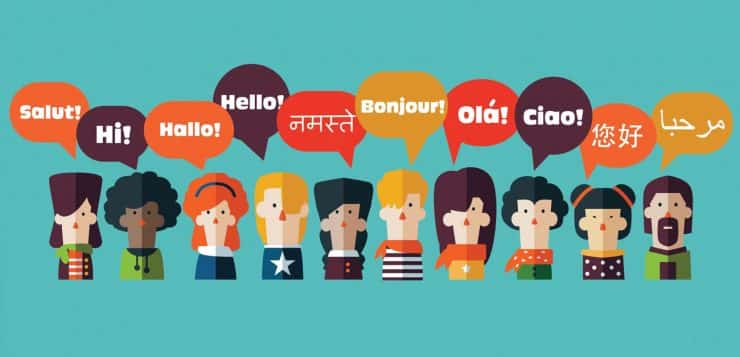The correct answer is: “it depends,” but you probably already knew that.
The next and most accurate answer is that it can take anywhere between three months to two years to learn how to speak, write, and read in a new language fluently.
A disciplined student who is being guided by a teacher, using the right learning methods, and learning a “category 1” language can gain intermediate fluency in as little as three months.
On the other end of the spectrum, the same student learning a “category 5” language needs two years to gain intermediate fluency.
What do these different “categories” represent? What factors can help you estimate how long it will take you to learn the language of your host country? We’ll go into detail below.
Five Factors That Determine How Long it Takes to Learn a Foreign Language
1. The Foreign Language Itself
There are five types of languages based on difficulty and study time required, as categorized by the Foreign Service Institute. The makeup of each language – its alphabet, grammar, pronunciation, and rhythm – ultimately determines the simplicity or complexity of learning it.
Let’s assume you dedicated 25 hours during the week to practice the language of your choice. How much you would have progressed in learning that language depends on which category the language belongs to.
Category 1 includes languages closely related to English, such as French, Italian, and Spanish. These will take a solid 600 hours to learn, or 6 months, to attain a level of General Professional Proficiency.
A Category 2 language, like German, is slightly more complex and takes an additional 2 months – for a total of 750 hours to attain that same level of proficiency.
Category 3 languages, such as Indonesian and Swahili, possess a moderate level of complexity and require a total of 900 hours, or 9 months, to attain proficiency.
Languages predominant in most Asian countries fall into Category 4, in which each language requires 1100 hours (nearly an entire year) to attain proficiency.
Lastly, Category 5 contains the most complex languages in the world, such as Arabic, Chinese, Japanese, and Korean. These require English speakers to invest 2200 hours, or almost 2 years. That’s twice as long as any category 4 language to attain proficiency!
2. Your Expectations (Desired Proficiency)
What is the level of fluency, or proficiency, that you’re pursuing? Maybe you just want to become conversationally fluent in Spanish, or perhaps you’re learning for a future career abroad.
Perhaps you’re a hobbyist polyglot who dabbles in new languages and focuses mostly on nailing the basics. Maybe you hope to be a fluent expat someday.
Every language learner has unique purposes and goals, and it helps to know what yours are so you can accurately estimate the hours required.
Use any of these three scales to help you decide where your desired proficiency falls:
- The ILR (Interagency Language Roundtable) scale consists of five levels from elementary proficiency at level 1, all the way up to native or bilingual proficiency at level 5.
- The CEFR (Common European Framework of Reference) for Languages consists of three levels: A (basic user), B (independent user), and C (proficient user).
- The ACTFL (American Council on the Teaching of Foreign Languages) guidelines are broken up into 5 main levels: novice, intermediate, advanced, superior, and distinguished.
All language learners should keep their end goal in mind. If your goals are for travel, basic vocabulary and grammar are enough to get your point across. If you eventually want to become a translator, you need advanced vocabulary skills and grammar precision.
In any case, setting the right expectations up front increases your chances of achieving your goals.
3. Your Background
Transferable skills help you learn closely related skills more efficiently, in many areas such as language learning.
In linguistics, mutual intelligibility is a concept that enables you to learn or recognize closely related languages and dialects with greater ease. In other words, if you spend the 1100 hours required to learn Hindi, you can learn its closely related languages – Gujarati and Urdu – in a fraction of the time.
In the three European language families, Germanic, Romance, and Slavic, some languages have such strong mutual intelligibility that different speakers can converse with each other by simply using their own language!
Still, you should beware of asymmetrical intelligibility. For example, Italian and Portuguese speakers can understand Spanish faster than a Spanish speaker can understand Italian or Portuguese.
Other factors that determine the time required to learn a language include your existing familiarity with foreign languages, as well as your previous exposure to the language within your circle of family and friends.
4. Motivation, Attitude, and Mindset
When learning any new skill, you’ll quickly find that it’s more technical, repetitive, and perplexing in nature than you imagined. You might get bored, frustrated, and discouraged at times, and that’s when you’re truly tested.
Successful people anticipate these moments and fight through them by sticking to the plan. They stay calm, knowing that the answer to whatever challenge arises will inevitably appear.
They maintain a “growth mindset” and embrace the struggle, trusting that they’ll not only achieve the goal with time, but also come out stronger as a person. They fixate on the work at hand, engage in positive self-talk, and refrain from associating their inability to do something with their sense of self worth.
Foreign language anxiety, AKA xenoglossophobia, is a real battle which many travelers, whether they’re aware of it or not, have to triumph.
Mastering even the easiest of languages will test your resolve during your study sessions. The more you’re able to persist through these moments, the more you relax through the puzzling concepts.
“If you are interested in something, you will focus on it, and if you focus attention on anything, it is likely that you will become interested in it. Many of the things we find interesting are not so by nature, but because we took the trouble of paying attention to them.”
― Mihaly Csikszentmihalyi, Finding Flow: The Psychology of Engagement with Everyday Life
In summary, every hour of language learning is not equal. The 600 hour estimate can quickly stretch to 800 or 900 hours if you regularly find yourself befuddled, frustrated, or easily distracted.
5. Teachers, Techniques, and Tools
Imagine two players working on their jump shot in basketball: one’s a self-taught learner who trains on his own using books, apps, and watching basketball films. The other learns the fundamentals from the coach on her high school basketball team and also trains on her own.
If both players practice 1,000 hours on their jump shot – perfecting their basic shooting form and range – the second player will likely become a more accurate shooter. She’ll receive expert instruction and immediate feedback, and quickly develop proper shooting techniques.
She’ll learn and use mental strategies, such as shot visualization and breathing exercises, to harmonize the mechanics of her mind and body. She’ll benefit from discipline, encouragement, and mentorship from coaches and teammates that the self-taught learner won’t.
Either approach is better than having no approach at all, but if you can hire a private instructor, you should certainly consider it.
Having a good language teacher either through group classes or one-on-one tutoring speeds up your learning process immensely. Getting into the habit of using learning tools, such as books, games, and mobile apps also speeds up your progress.
Finally, getting familiarized with (meta)cognitive techniques and learning strategies can really help:
- Mnemonic devices
- Language cognates
- Diglot Weave Technique
- Spaced repetition memory system
- Brain soaking
Final Thoughts
You can learn the language of your host country with a slow and steady approach of self-study, or you can take a fast and furious approach with professional help. Either way, always keep your goals and overall purpose in mind.
Guest Author: Raj Shah is a senior manager at TakeLessons. You can check out the TakeLessons blog here!








Discussion25 Comments
nice thanks a lot
merci
thanks so much for the information
Someone told me that he learned Spanish in three months to a confident speaker. I find that hard to believe, but if it’s true, he’s doing great.
Learning time varies depending on each individual and their abilities. Nevertheless, it is possible to learn a foreign language if you put in enough effort.
Nowadays, learning any language is really difficult. That’s something I remember needing help with. Fortunately, I was able to find out more about these cases and figure out where I needed to go. Consider where a translator may provide a translation from translate english to french when choosing a professional translator. They were incredibly helpful, and I am appreciative for their efforts. I hope I was also able to help someone else with this!
I thought it was interesting when you mentioned that it can take around three months to learn a new language. I would like my son to learn a new language. It might be a good idea for me to find a language academy that I can send my son to.
I think you are really misleading the audience with untrue statements. Can someone be on the intermediate level in 3 months? Of course! Did you explain that intermediate level is immediately after the initial, starter class? And all you can confidently say/do is say the numbers of the phone number, ask for someone’s name or tell someone that you are wearing blue pants. (probably you won’t be even able to tell that you are wearing jeans).
I’m very good with languages, and I have been immersed in the culture in order to learn English. It took me 10 years. And English is one of the easiest, if not the easiest language to learn.
Maybe what I needed for my ‘fluency’ will differ for you. I needed to be on the most advanced level, to speak and write lecture materials. If you are a simple person who will not need extensive writing in your life, or at work, or that the accent from your original language does not bother you, you might get to fluency on a more basic level in 2 to 5 years.
You need to ask yourself this question: what percentage of your own language do you speak and interact with? If this is let’s say 2000 words, you will arrive much sooner to your destination than someone who needs 25000 words minimum (e.g. a medical student).
I’m currently studying French. It has been 9 months, full immersion, with conversational and instructional classes, lots of balls in the air. I’m on the intermediate level. Intermediate is not fluent, just like waving hands to explain something is not fluency.
Beware of internet ‘polyglots’, as they only know basic language, e.g. names of the dishes in target language, or basic exchanges. To learn any new language, you need to dedicate yourself DAILY for a long, long time. Without daily engagement, you won’t get very far, and you can multiply my time estimate by the factor of 2, 3, 4, or never.
In my French class, there is a woman who studies for 20 years, and yet she is on the same level with me who is only studying for 9 months. Why? Consistency!
But having said that, don’t let my words discourage you. The initial part, beginners and early intermediate is truly fun, so jump in and open your heart to the new world.
I’ve been studying Portuguese for over 8 years now and I’ve visited Brazil 18 times. I practice every day with my girlfriend who only speaks Portuguese and we’ve been doing it for over 5 years. I study every day and use multiple study resources but I still haven’t had a conversation and I can’t read or understand what people are saying. I have to translate everything into English to understand. I usually score very high on aptitude tests so I’m not stupid. The Portuguese words just don’t mean anything to me until I translate them into English. My son can converse and he’s never studied a language, he just picked it up while visiting Brazil with me.
I have teachers, I read books, use apps, use language groups to practice, watch movies and videos and other things but nothing seems to work. Even basic words I know have to be translated. Any ideas? Thanks
I practice every day with my girlfriend who only speaks Portuguese and we’ve been doing it for over 5 years. I study every day and use multiple study resources but I still haven’t had a conversation and I can’t read or understand what people are saying. I have to translate everything into English to understand. I usually score very high on aptitude tests so I’m not stupid. The Portuguese words just don’t mean anything to me until I translate them into English. My son can converse and he’s never studied a language, he just picked it up while visiting Brazil with me.
I have teachers, I read books, use apps, use language groups to practice, watch movies and videos and other things but nothing seems to work. Even basic words I know have to be translated. Any ideas? Thanks
I believe many of us are interested in writing our own human resource management research papers, and everyone uses different sources for this. Personally, I prefer to use the Essays on Science database because it has a sizable, completely free repository of excellent and expert work from which you can produce engaging essays and other types of writing. Due to their complexity, it is particularly appropriate for topics relating to human resources.
I think you shouldn’t send your son to any course because I tried lots of way like course and according to my experience,the best way to learn a foreign language is to spend most of your free time on what you want to learn at your home.And I also should mention that the language that I have been learning is English which is one of easiest language in the world and if the courses don’t help me to learn English,I don’t think they can help the other languages more difficult than English.
It’s crucial when selecting a top-notch gaming platform that it can satisfy all requirements for usability and quality, which in turn ensures recognition and acceptance. Since I am aware of how quickly and effectively eth betting usa develops and enhances its capabilities, I want to highly recommend them. Their integration of cryptocurrency systems is particularly impressive. I also want to draw attention to the wide selection of games and broadcasts, which is very useful because it enables you to enjoy yourself more with just one tool.
I just got here a little while ago, and it’s great. I was really drawn in by the piece of information you have here. Thanks a lot for making such a great blog page
5 factors that determine how long you learn a foreign language are very good, thank you for sharing
Here, you can achieve amazing offers through devilsfilm coupon code
Flagle is a Wordle spin-off with the challenge of guessing a country through their flag over six attempts instead of guessing an English word.
Here’s my own tip for learning a new language, get involved.
I learned a lot from your blog, and you can learn more about older video games to have more engaging experiences. I look forward to playing with you in the past!
Learning foreign languages for life
Yung Gravy’s height is a commonly asked question about him. He is notably tall and distinguishes himself from other rappers. As per information from his official website and celebnetworth, Yung Gravy’s height is 6 feet 6 inches, which is equivalent to 198 centimeters.
@ Anna, your reply is one of the best so far. There are exceptionally gifted individuals and those with “photo memory” who can indeed learn a new language in a few months but they are also the polyglots who pretty much make it a full time job to do that. Better examples are normal people who can “only” dedicate say 4-5 hours per week on a foreign language and may not necessarily be in an immersive environment, ie, living in a foreign country where the target language is spoken. In my case I have been studying Bulgarian language for 2 years (this is my 5th language), mostly in a classroom setting, and I can say that I am nowhere near intermediate level and am conversational in only basic daily topics. To be able for me to speak about themes outside of daily life, such as say economics, history, social issues will require at least a few more years of study and immersion.
I’ve been studying Portuguese for 9.5 years now and I’ve visited Brasil 18 times but I still can’t read or converse and I have to translate everything into English to understand. I study every day and practice with my girlfriend who only speaks Portuguese every day and have for 6.5 years now but I still can’t understand her except for an occasional word that I have to translate into English. I can only say good morning and hello without translating.
However, there are inherent risks involved – from financial burdens to cultural adjustment challenges. It’s crucial for best payout online india prospective students to carefully weigh these factors and make informed decisions to ensure that the potential rewards outweigh the risks.
In candy clicker an extremely addictive incremental game, players must continuously click on candy in order to score points. The objective is to obtain upgrades, hit specific benchmarks, and collect as many candy as you can. The game delivers a rewarding and engaging experience as players progress and uncover new content, despite its simple rules.
Anchor Text